“Do you ever feel that History is a Person?” Corzoo suddenly asked on our way to Dresden.
“Well, not exactly like a Person, but I think I might know what you mean,” I replied. “Do you mean like someone who is right here with us, rather than far away and remote in the past?”
“Yes!” he said. “And I think he has been following us all over Europe!”
This was very perceptive of the young Corzoo, I thought, and as we arrived in Dresden, I began to realize that my little friend might feel History even more keenly here – because it was more recent than much of what we had been experiencing.
The outskirts of the city were often bleak. There were desolate plots of land, run-down buildings covered with graffiti, and overgrown gardens. However, as we crossed the river into the old part of town we saw glimpses of what Dresden used to be. It had been known as the “jewel box of Europe” before the end of World War II when it was all but destroyed by bombs. It was known for its elaborate baroque and rococo architecture, and it had been a cultural center of Europe. But the war, and the awful things that happen during war, had changed the face of Dresden forever.
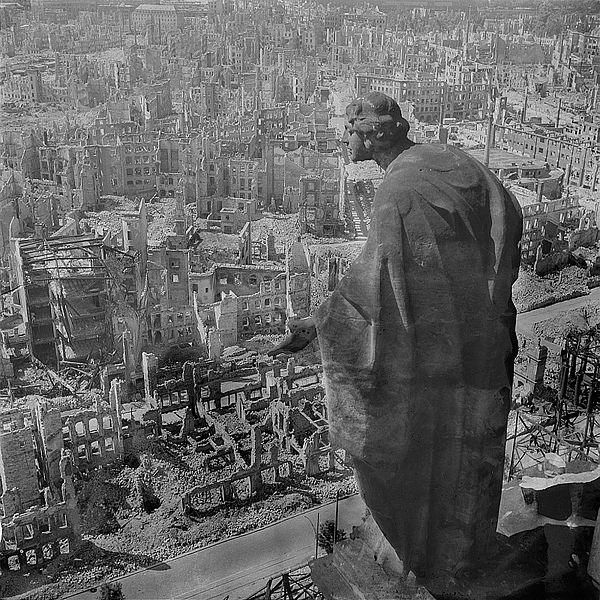 Once we settled into our room, we read up a bit on the history of the hotel and discovered that where we were staying, the Taschenbergpalais, had been the Wermacht headquarters in Dresden! We also found a photo of what Dresden looked like after it was bombed.
Once we settled into our room, we read up a bit on the history of the hotel and discovered that where we were staying, the Taschenbergpalais, had been the Wermacht headquarters in Dresden! We also found a photo of what Dresden looked like after it was bombed.
Dave had been here in the early 1990’s, not too long after the reunification of Germany, and the city had changed drastically since then, he said. “Do you remember the outskirts of the city we came through?” We nodded. “That’s more or less what the entire town looked like then. They have done a lot of work!”
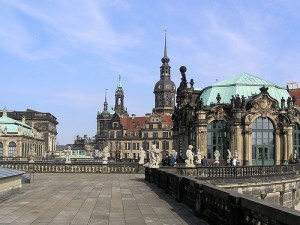 We only had a few short hours that afternoon, so out we went for a walk. We walked across the street to the Zwinger, a baroque palace, and through the center of the city to the Frauenkirche, then to the river.
We only had a few short hours that afternoon, so out we went for a walk. We walked across the street to the Zwinger, a baroque palace, and through the center of the city to the Frauenkirche, then to the river.
“Look at the different colors of bricks!” Corzoo said as we passed several structures. Some of them were black from age and soot and pollution, and some of them were white and clean.
“The black ones are the older ones,” Dave said, “and the white ones are newer. They have been doing restorative work here, hoping to reconstruct the city to a portion of its former beauty.”
“But with such complete devastation, why not start from scratch?” Corzoo asked.
“Well, that is one approach to rebuilding, to be sure, and I’m sure they did that quite a bit,” I speculated. “But here in the center is where there most treasured buildings are. Such buildings are valued because of their history, what they represent, and the care that went into creating them.”
“Oh, I see,” said Corzoo. “Naturally they wouldn’t want to just throw it all away.”
I told Corzoo about what I learned in one of my very favorite passages from The Book Of Tea, a book about Japanese aesthetics. “Do you know what they used to do in Japan for a very treasured and prized tea cup when there is an accident and it falls and breaks?”
He shook his head.
“They don’t throw it away. Instead, when they repair it, they fill the cracks with gold and put it back on display.”
“So people can see that it has survived and now is more precious than ever!” he exclaimed.
“Yes, I believe so. Its very imperfection becomes something to marvel at and treasure.”
The next day, we were off to Berlin, where again, we had only a few hours to explore. We made it to the Brandenburg Gate and to the Reichstag, and then we met an old friend of mine – Christian Biegai. He is a Berliner, but lived in New York for a while which is where I got to know him. Now he is back in Berlin, writing film music and playing the saxophone.
While walking around our hotel, both Dave and I were thinking – this is very weird! The area had a bizarre feeling. Christian explained – it is because this area of Berlin was no-man’s land when the wall was up. The wall was a sort of double wall, and this was the area in between. Aha! Now it made sense. Too bad we didn’t have time to explore some other areas of Berlin to get a feel for a different area. Some day!
 The next day we flew to Frankfurt, the major financial center of Europe. Just so one doesn’t forget, a very large statue of the Euro sign has a prominent place in town.
The next day we flew to Frankfurt, the major financial center of Europe. Just so one doesn’t forget, a very large statue of the Euro sign has a prominent place in town.
We had planned a boat trip on the Rhine River for Dave’s free day, and as we walked towards the departure location with Corzoo in tow we were excited about seeing the river and the ancient and storied castles.
My first impression of the tour office was one of, shall we say, worried hope. It was a tattered and shabby little hole of an office, and it seemed that one guy was running the show. People trickled in from all over – four elderly ladies from Australia, a British woman, another couple of Australians, a Spanish couple, a mysterious young woman who turned out to be from Siberia, an American couple, and finally a Middle Eastern couple and their two daughters. One of the daughters was a very young baby – quiet and happy. The other was about three years old and she was screaming at the top of her lungs, which her mother later attributed to the fact that she was teething.
So began our adventure. We first had to take a bus to our embarkation location on the Rhine, and it was not a quiet ride, let me tell you. Dave looked positively ill as did little Corzoo. This was not looking good.
The tour guide told his jokes loudly over the P.A. system of the bus so as to project over the little girl’s wails. By the sounds of it, he had told these jokes every single day – and enjoyed telling them in many languages!
Corzoo huffed and repositioned himself so as to get a look farther back in the bus at all the unfamiliar faces. That is when he noticed that directly behind us sat an elderly gentleman we hadn’t noticed before. He had a long, gray beard and was sitting quite still with his eyes closed.
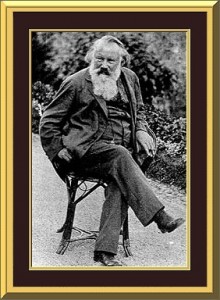 “The man behind us looks remarkably like Johannes Brahms!” whispered Corzoo to me.
“The man behind us looks remarkably like Johannes Brahms!” whispered Corzoo to me.
I turned my head to take a quick peek.
“He does, doesn’t he? But you know it’s not possible. He lived in the 1800’s!”
“I know but….I think it might be him.”
“Well, OK, but it’s not polite to stare,” I cautioned him.
Before I knew what had happened, Corzoo had slipped between our seats to sit next to the man. I heard him say quietly, “Entschuldigung! Excuse me! Herr Brahms?”
The man with the beard opened one eye and looked down at little Corzoo. He grunted. “Ahem, ahem.” Then opened both eyes and gave Corzoo his full attention. “Is it possible that a tiny version of one of my favorite instruments knows who I am and is calling my name? Am I dreaming?”
“I thought that I was the one who was dreaming when I saw you, Maestro,” said Corzoo. “So it is really you then?” asked Corzoo.
“It is, indeed – in the flesh, I think – or perhaps not. I can’t be sure.”
“What in the world are you doing here?” Corzoo asked.
“Well, it is my country, not yours, boy!” he said gruffly, a little indignant. “Nevertheless, it is surprising, I suppose, to find me on whatever kind of large horseless carriage this is. They told me it would take me to the boat so I could go for a little Rhine Journey.”
“So you came here to go on a Rhine Journey, Herr Brahms?” Corzoo asked.
“Well, no, not exactly. Hmm, let me try to explain,” he said. “Every once in a great while, the Powers That Be decide to send me as an ambassador of sorts – an ambassador of History and Music and Beauty. They find people who are curious and sensitive and open to meeting me, and send me to talk things over with them. However, I think the Powers got their wires crossed this time and sent me down to talk with the wrong young lad.”
“Why do you say that?” Corzoo asked.
“Well,” continued Johannes Brahms, “I was supposed to meet this young man in the park at eight o’clock this morning. Then at precisely one minute to the hour, according to the nearest clock, I received a message via pigeon.”
“Via pigeon? Like the bird?”
“Of course, like the bird, young man. How else does one receive a last-minute, urgent message?”
Corzoo held his tongue when he realized that it would be very difficult to explain to Mr. Brahms the advent of texts and emails, and even then, he wouldn’t have a device on which to receive such things anyway.
“In any case,” continued Brahms, “the message was very curious.”
He handed Corzoo the folded piece of paper the pigeon had delivered to him:
Herr Brahms,
After consulting my daily schedule this morning, I regret to inform you that I have a variety of conflicts with the scheduled hour of our rendezvous:
1) I have a How To Make Breadcrumb Trails class at 9:30AM – 11AM on Mondays and Wednesdays. We have a test coming up, and I cannot afford to be a moment late.
2) My Synchronized Plate Spinning rehearsal is from 11am-1pm on Mondays and Wednesdays. Tardiness and absences require three and a half week advanced notice, but I only just received information regarding our meeting time two and a half days ago.
3) Foot and bicycle traffic make it impractical to navigate your preferred corner of the park from 7:30AM-9:30AM. Therefore, access to and from the specified park bench is limited because of congestion and I cannot guarantee my punctual transit.
For these above-stated and most worthy reasons, I believe my time with you needs to be rescheduled for another day and time. The Powers That Be have a spreadsheet on which my availability is recorded. To be brief, I am only available between 2:30-3PM tomorrow, between 1pm and 3pm on Thursday. And then from 11PM-11:30PM on Friday. After that I need my beauty rest.
I am sorry that the Powers That Be made such a mistake. It is shocking and has deprived you of getting to know me.
Thank you!
In The Name of All That is Worth Something In This World,
The Young Budding Maestro Stinkenputz
Corzoo looked at the paper in disbelief. “But, doesn’t he realize that you are Johannes Brahms and that you have traveled through time and space and possibly from another dimension to be here?” he asked. “Even if he doesn’t realize all of this, this is no way to treat anyone, Brahms or not!”
“Well, boy, there’s nothing I can do to change his ingrained ways. So, I thought to myself, ‘Well, what am I going to do with this time in this strange modern world now that I am here?’ That’s when I passed a sign that proclaimed, “Today is your lucky day! Take A Boat Ride on the Rhine!” – and in five different languages! I thought it must be a sign from The Powers That Be. So here I am – on a Rhine Journey! It would give old Wagner and all the Wagnerians a turn in their graves!” he chuckled to himself. “Imagine, Johannes’ Rhine Journey! It is ironic, no?”
“Ironic why?” Corzoo asked, a little confused. “Didn’t Wagner like you?” The thought of this came a surprise to Corzoo. He had thought that all composers must have some sort of affinity for each other.
“Let’s just say he was a very outspoken and lively man, and things had to be a very certain way to suit him.” Herr Brahms said. “There were those who liked his music and there were those who liked my music. People even came to call it the War of the Romantics. We were men of different stripes. Plus, I was a very unpolished and old-fashioned fellow. I liked to roam the woods, and I had very broad-minded tastes and inspirations in my music. And, to top it off, you see – I am wearing no socks!” He pulled up a pant leg to reveal his bare, hairy ankle. “Socks make my ankles itch, so I don’t wear them unless I really must wear them to keep warm. Otherwise, why bother? Am I going to wear itchy socks just to please people who are offended by my lack of socks and who do not understand the trials of an itchy ankle? I think not! Plus they take time to put on, and I am anxious to get out of doors when I get the hankering!”
Corzoo laughed. He felt as if he had found a kindred spirit in Mr. Brahms’ untamed nature. “I have good news for you, Herr Brahms – they make socks now that are less itchy.”
“Accchhh! I can’t be bothered. In any case, I am only here for today, then I go back to the Great Beyond until the Powers That Be schedule me for another rendezvous.”
“Attention! Attention!!” The tour guide was on the P.A system. We struggled to hear him above the screaming not-so-little girl whose teeth were allegedly coming in. “Attention, attention, ladies and gentlemen! Today, I have very exciting news for you. Very good news, indeed. Before we embark on our boat trip of the magnificent Rhine River to see the World Heritage Site and the impressive Lorelei rock, we will be stopping at a typischer German restaurant for a little lunch. It is our treat and included in the handsome price you paid for your ticket today.”
Dave and I looked at each other. What?? We thought we would at least get to go on the boat ride first. We had only just finished our breakfast!
“Yes, that is right, ladies and gentlemen. But remember, it is only the food that is included in your lunch. If you would like anything to drink, anything at all – and that includes water – you must pay your waitress.” He proceeded to translate to the Spaniard. “Las bebibas no son incluidas!”
“And I have another excellent surprise for you, ladies and gentlemen. Yes, another surprise. We will take the bus up to the top of the hill so that you can ride down on the gondola to the restaurant. From there you will have excellent views of the renowned vineyards of the region and of the beautiful and famous Rhine River. Yes, the most excellent views!” He said with a flourish. “Please be advised that you must pay seven euros to ride the gondola.”
“Siete euro para llevar la gondola!” he yelled to the Spanish couple.
“If you do not wish to take the gondola down, we will take the bus back down the hill, which will no doubt contain the screaming child, and deposit you at the restaurant. This is a free service.” He proceeded to translate, “Es gratis para regresar por autobus con la niña desconsolada.”
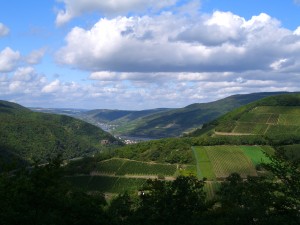 Seven euros each or no, we were getting off of that darned bus.
Seven euros each or no, we were getting off of that darned bus.
“Herr Brahms,” Dave said, “we are happy to treat you to a nice quiet ride on the gondola down the hill.”
“Thank you, Herr Bilger, but I think I might just walk down the hill.”
“Really?” I asked. It did seem very far.
“I have missed my walks in the woods, and now I have my chance,” he replied. “I will see you on the boat!”
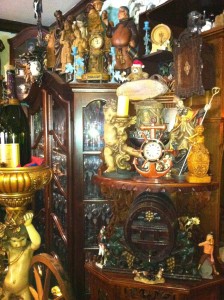 “On the boat? But what about lunch in the typischer German restaurant?” But Herr Brahms had already disappeared into the trees, his hands clasped behind his back. He was indeed an accustomed hiker, moving deftly over the roots and twigs in his sock-less feet.
“On the boat? But what about lunch in the typischer German restaurant?” But Herr Brahms had already disappeared into the trees, his hands clasped behind his back. He was indeed an accustomed hiker, moving deftly over the roots and twigs in his sock-less feet.
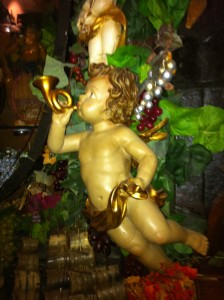 Let’s just say that we wish we had joined Mr. Brahms on his hike, because, though the gondola ride was quiet and did indeed have lovely views, the restaurant was, shall we say, meant for people taking a tourist bus to get to a tourist boat ride on the Rhine – not for people like myself or Dave or Mr. Brahms. Then Corzoo pointed out to us that we were taking a tourist bus to get to a tourist boat ride on the Rhine River. I guess we couldn’t argue there. Corzoo managed to find delight in the kitschiness of it all and we did have some excellent laughs.
Let’s just say that we wish we had joined Mr. Brahms on his hike, because, though the gondola ride was quiet and did indeed have lovely views, the restaurant was, shall we say, meant for people taking a tourist bus to get to a tourist boat ride on the Rhine – not for people like myself or Dave or Mr. Brahms. Then Corzoo pointed out to us that we were taking a tourist bus to get to a tourist boat ride on the Rhine River. I guess we couldn’t argue there. Corzoo managed to find delight in the kitschiness of it all and we did have some excellent laughs.
Finally, it was time to catch the boat. We found Herr Brahms leaning over the railing looking thoughtfully as the water flowed and churned beneath him. He was humming a little tune and looked calm and invigorated from his walk.
This was the best part of the day. It was windy and chilly on the top deck, but we didn’t mind a single bit. The air was fresh, and we were not inside of a noisy, cramped bus or kitschy restaurant.
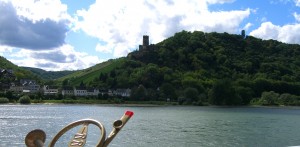 We passed castle after castle. Some were in ruins. Some had been made into hotels or youth hostels, others were now owned and occupied by people who made their homes there. While we were watching the scenery go by, Corzoo ventured to ask a question of our esteemed companion for the day.
We passed castle after castle. Some were in ruins. Some had been made into hotels or youth hostels, others were now owned and occupied by people who made their homes there. While we were watching the scenery go by, Corzoo ventured to ask a question of our esteemed companion for the day.
“Herr Brahms, is the horn really one of your favorite instruments?”
“Ahem,” he said, jolted out of a reverie. “Well, I wrote the trio for the horn and piano and violin, didn’t I?”
“Yes, sir, you did.” Corzoo replied.
Mr. Brahms looked sideways at Corzoo, annoyance giving way to curiousity. “Aren’t you a little young to know much about my horn trio?”
“Oh no, Herr Brahms. Well, maybe. I mean to say that I am young, but I hear Frau Bilger playing it from time to time, and I like to learn about pieces that I didn’t know of before, so I did some research.”
“And what did you find out?”
“I found out that you wrote it for your mom, and that you were inspired by your walks in the woods.” Corzoo spilled out his sentence all very quickly and matter-of-factly so as not to come across as too sentimental and prying.
“And?” he prompted.
“And you wrote it with the natural horn in mind rather than the valved horn, even though it was the valved horn which was gaining in popularity when you wrote the piece.”
“Yes, you know, I played the natural horn – the Waldhorn! I love the sound and the poetry of it. It is a sound from the earth!”
“But Frau Bilger only plays the valved horn.”
I tried to shush Corzoo. I didn’t want to offend Mr. Brahms by making him aware of the fact that I did not play his piece on the instrument he most loved.
“Well,” Herr Brahms said, “she is trained on the modern horn and no doubt would sound dreadful on the natural horn.” I nodded in agreement. “As long as she always promises to perform the piece with the sound and the tendencies of the Waldhorn in mind, I will forgive her.”
“Thank you, Mr. Brahms.” I replied sheepishly. “I promise I shall do my best to give informed and thoughtful renderings of your piece.”
“Yes, Corzoo,” said Herr Brahms, becoming introspective again. “I wrote it as a way to grieve for my mother when she left this world, and I took comfort and inspiration in the woods, as always, and in the sounds and instruments of my childhood. It is music from my life and my heart. Would you like play it one day?”
“I would, sir!” Corzoo exclaimed. “I hope to become good enough to do it justice.”
“I have a hunch that you shall, young man.” said Herr Brahms quietly as we passed by another medieval castle.
Corzoo leaned over to me. “Psssstttt” he whispered. “He filled the cracks in his teacup with gold, didn’t he?”
“I should say so, my little friend!” I was glad that Corzoo had seen how Mr. Brahms made something very special out of the sorrow he was feeling for his mother.
Our boat ride had been going splendidly. We saw such beautiful castles and vineyards and quaint little towns.
All of a sudden, “Holy Lorelei!” cried Corzoo. We nearly jumped out of our skins when the speaker in front of us started blaring a tune, unfortunately on the trumpet. Dave was the first to cover his ears. We were passing the famous Lorelei rock where legend has it that a mermaid would distract sailors with her siren song and many boats crashed against the rock. Needless to say, rather than finding their dream-mermaid, they found a watery grave instead.
“I shall go to my watery grave too if they don’t stop this awful, blaring song!” Dave yelled above the din. He pretended with ears covered to be ready to jump overboard.
“Ladies and Gentlemen, we are passing the very famous Lorelei Rock!” the announcement proclaimed excitedly in English, German, French and Japanese.
Very soon after the grand finale of the Lorelei Rock, it was time to get off the boat – by ramp to the dock, not by jumping. It had been a very short hour and a half. We waited as long as we could before getting back on the bus, looking at the river and enjoying the fresh air.
“Attention, attention, ladies and gentlemen!” said our tour guide once we were back on the bus. “I have yet another great surprise for you,” he shouted. “We will now return to our favorite typischer German restaurant for a very nice wine tasting of the very famous wines that are made in this very famous region. We have only the best for you to sample.”
Return to that restaurant?!?! Oh no!
“I smell a sales pitch,” muttered Dave. “You know that’s coming!”
The last thing we wanted to do was go back there. We looked for a way to escape. Was there a train station close by that we could take back to Frankfurt? Nope. No escape.
Fortunately, the scenery was slightly different this time, as we were all crammed into the other half of the restaurant – the one with the Lorelei Mermaid Theme.
Each thimble-full of wine came with a full fifteen-minute description from a waitress whose voice was like fingernails on a chalkboard. Early on, Mr. Brahms had his fingers in his ears and headed towards the door.
“Hey you!” shouted the waitress, her abrasiveness making our stomachs churn. “Where are you going? You don’t want to taste the best wines in all of the world?”
“I’ve lost my socks and have to go find them. Forgive me!” Herr Brahms said as he pointed at his bare ankles and shrugged his shoulders helplessly. Out the door he went to his freedom.
Dave and Corzoo and I immediately wished we had worn no socks as well. But we decided not to make a scene and stayed almost to the end. I finally felt it wouldn’t be too impolite to get out of my seat once the sales pitch came, just as Dave predicted.
“We have a surprise for you, ladies and gentlemen!” she shouted. We all braced ourselves. “All of these very, very special wines are here for you to purchase and take home with you. You can’t find them anywhere else in the world. Only here! And if you buy three bottles, you get the fourth for free!”
We were soon back on the bus and had a couple other “surprise” stops on the way back to Frankfurt. Let’s just say that the tour guide made sure to come through and collect his tips BEFORE it was obvious that we were stopping by the airport to drop one of the tourists off for her flight. No doubt she had slipped him some Euro.
At the end of our eight hour tour, we felt drained by being dragged this way and that by our enterprising tour guide, but happy for the boat ride, short as it was, and very happy for the company of our unexpected fellow tourist.
“Herr Brahms,” said Corzoo, “I am sorry that your first appointment didn’t work out this morning, but I am so glad to have met you.”
“Well,” said Mr. Brahms, “I believe that perhaps the Powers That Be intended for me to meet you all along.”
“Really?” Corzoo asked, elated.
“They work in strange, roundabout ways sometimes,” he said. “You think you are going one place, but then you end up going somewhere else, and before you know it, something wonderful and good has happened – like getting to spend some time with a lively, curious boy who has a good and thoughtful heart. It’s OK with me if our environment was a little cluttered and kitschy and loud at times. That’s what the fingers-in–the-ears and walks in the woods are for!”
“Where are you going now?” we asked him.
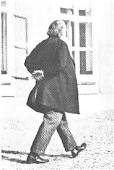 “Back where I belong,” he said, and without a trace of melancholy. He could see, though, that we were feeling melancholy at the thought of his departure from us. “However, you never know when I might drop in again.”
“Back where I belong,” he said, and without a trace of melancholy. He could see, though, that we were feeling melancholy at the thought of his departure from us. “However, you never know when I might drop in again.”
He had a smile and a twinkle in his eye as he turned towards the park, hands clasped behind his back, bare feet rubbing against the insides of his leather shoes.

One Response to Corzoo’s Rhine Journey – and an Unexpected Traveling Companion